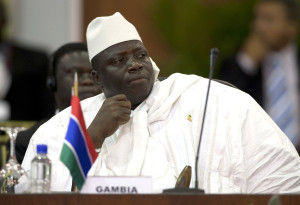Gambia’s government has issued a statement announcing the former colony is withdrawing from membership of the Commonwealth with immediate effect and vowing never to return.
Part of the statement reads: “[The] government has withdrawn its membership of the British Commonwealth and decided that the Gambia will never be a member of any neo-colonial institution and will never be a party to any institution that represents an extension of colonialism.”
The Commonwealth bloc is a voluntary association of 54 countries, many of them former territories of the British Empire.
A popular destination for British tourists, Gambia has been condemned in the past by the British government for human rights failings, including when it executed nine death-row inmates by firing squad in August of last year.
Rights groups such as Amnesty International have also criticised the government of President Yahya Jammeh for cracking down on dissent and targeting political opponents and sexual minorities for arrest and detention, among other alleged abuses.
Earlier this year, Gambia was singled out for its poor rights record in Britain’s annual Human Rights and Democracy report, which cited cases of unlawful detentions, illegal closures of newspapers and radio stations and discrimination against minority groups.
Last year, President Yahya Jammeh warned foreign diplomats that his country would not be “bribed” with aid to accept homosexuality.
“If you are to give us aid for men and men or for women and women to marry, leave it. We don’t need your aid because as far as I am the president of the Gambia, you will never see that happen in this country,” he said.
No official confirmation as to what triggered the decision to leave the Commonwealth has been offered but there is speculation that the decision came after the government rejected a proposal by the Commonwealth last year to create commissions in Banjul to protect human rights, media rights and fight against corruption.
A spokesman at the British Foreign and Commonwealth Office said early Thursday: “We would very much regret Gambia, or any other country, deciding to leave the Commonwealth.” He noted however that “decisions on Commonwealth membership are a matter for each member government”.
The Gambia is Africa’s smallest mainland nation. The Portuguese, French, and British empires have competed for colonial supremacy in the West African state since the mid-fifteenth century. It is estimated that well over three million people from present-day Gambia were sold into slavery during the transatlantic slave trade.
Today’s Gambian boundaries were formed in 1889 as the area became a British Crown Colony known as British Gambia. It formed its own executive and legislative councils in 1901, and on February 18, 1965 Gambia gained independence as a constitutional monarchy within the Commonwealth of Nations.











